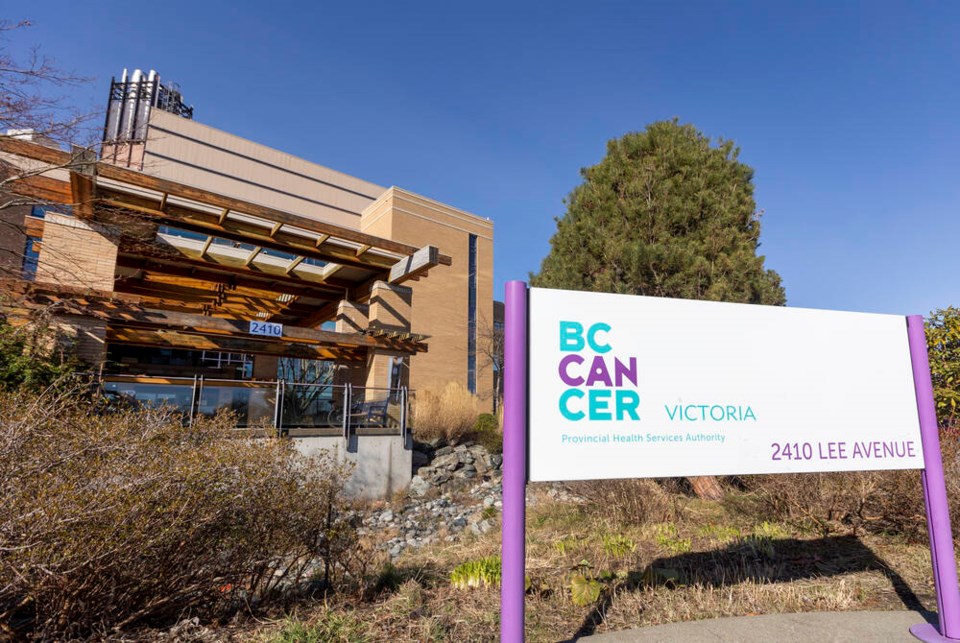The B.C. government unveiled a 10-year cancer-action plan Friday, with an initial investment of $440 million over three years to better detect, treat and prevent cancer.
It said the investment is needed as the population ages and cancer becomes more prevalent.
The initial funding aims to expand cancer-care teams, hours of care and access, revise payment models for oncologists and other cancer-care professionals, improve cancer screening programs, and support travel costs for patients from rural communities.
In 2021, about 30,000 people in B.C. were diagnosed with cancer — a number that’s expected to reach 40,000 in the next decade — and more than 11,000 died because of the disease.
The funding includes $270 million over three years for expanded care hours, revised oncologist pay, better screening for cervical, lung and hereditary cancers and more Indigenous-focused care.
The remaining $170 million is a one-time grant to the B.C. Cancer Foundation earmarked for more clinical trials, genomic testing and expanding access to new diagnostic and therapeutic approaches and treatments. It will support more research and attract more cancer-care experts to provide specialized treatments, said the foundation.
Dr. Kim Chi, chief medical officer at the B.C. Cancer Agency, called the funding and plan unprecedented, saying it’s the “most significant investment in cancer care the province has ever seen.”
“It will save lives and address the growing demand for cancer care we have today and for the next 10 years as our population grows and ages,” said Chi, an oncologist for nearly 25 years.
Asked about wait times to see an oncologist increasing to 43 days in January from 30 days last year, Chi said currently the B.C. Cancer Agency aims for 90 per cent of people be seen by their oncologist within four weeks of referral. Then, most patients should receive their chemotherapy within two weeks of when they are ready to be treated, or four weeks for radiation.
“These are achievable goals,” said Chi, “we’re building towards those goals.”
The province is aiming to improve vaccination initiatives to eradicate cancers caused by HPV, and expand cervical cancer screening to include more at-home tests.
Other priorities include modernizing pediatric cancer services, expanding treatment hours, reducing wait times for surgery, improving connections to palliative care, and establishing a provincial CAR-T immunotherapy program.
It aims to improve cancer survival rates and quality of life for survivors, and eliminate cervical cancer in B.C.
Premier David Eby called cancer one of the greatest challenges, noting he was 20 when he lost a cousin to childhood leukemia. With advancements in research, if she was diagnosed today — 26 years later — her life might have had a different outcome, he said.
The 10-year action plan and funding builds on $1 billion in investments since 2017, said Eby.
One in two British Columbians will face a cancer diagnosis in their lifetime, but advancements in treatment and even cures for certain cancers mean more people are surviving the disease, requiring ongoing care.
Health Minister Adrian Dix said the province is investing in research, technology and innovation to strengthen cancer care in B.C. and hopefully achieve a cancer-free future for more people, accelerate treatment for those diagnosed with cancer and help thousands more survive.
The plan, developed with B.C. Cancer Agency, aims to make cancer care more equitable for people living in rural and remote communities by increasing funding to support travel expenses, with a longer-term goal of establishing more cancer-treatment centres throughout B.C.
The province is providing a grant to the B.C. Cancer Foundation to support cancer research and attract cancer-care providers.
B.C. Cancer chief operating officer Heather Findlay said the plan will enable its more than 3,000 health-care team members and the scientific community to deliver timely care.
She said the plan is also being applauded because it includes multiple years of funding.
“We look forward to rolling up our sleeves and getting to work,” she said.

.png;w=120;h=80;mode=crop)

